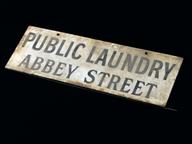Bed Bay No.11 From Ward 18 from NHS Nightingale North West
Bed bay no.11 from Ward 18 of NHS Nightingale North West temporary hospital. The bed space comprises a back panel with all necessary services (e.g. lights, sockets, medical gas outlets) and two small side walls. NHS Nightingale NW was set up in the Manchester Central Convention Centre in 2020 during the COVID-19 pandemic to provide additional hospital bed space to reduce strain on permanent NHS hospitals.
In early 2020 when the COVID-19 pandemic grew in the UK, there was a concern that the NHS would be overwhelmed. The construction of temporary hospitals highlights the scale of the pandemic. In March 2020 Manchester University NHS Foundation Trust was asked to open a temporary hospital to provide additional facilities to care for COVID-19 patients in the North West. NHS Nightingale North West (NNW) was set up in Manchester Central. It accepted its first patient in the space of 14 days.
This material illustrates to both the public health response to the pandemic and the collaboration between industries and societal organisations like the NHS and the army to construct and equip the Nightingales in such a short space of time. It represents the problems of supply of many different goods and the important role of the manufacturing and building industries in the response to the pandemic.
The Nightingales also emphasise the fast moving and ever changing nature of our understanding of the virus and pandemic. It was set up to take thousands of patients but never came close to full capacity. NNW admitted more patients than most Nightingale hospitals as it was set up on different clinical lines.
The first phase of use ran until summer 2020 and admitted 104 patients. The hospital was then stood down over summer as cases of COVID-19 reduced. As cases began to rise again with the UK’s second wave, it was quickly brought back into use. NNW was reorganised to take non-COVID patients for rehabilitation to free up space for COVID patients in permanent hospitals. NNW reopened on 28th October 2020 and admitted 350 patients in this second phase. The last patient was discharged in the third week of March 2021.
The hospital wards and bed bays were constructed using a flatpack technique with a back panel that contained all the necessary services for each bed, including sockets and medical gas outlets. The non-standard nature of a number of the items highlight the difficulty that was met with in trying to construct and equip a number of temporary hospitals in a very short space of time.






